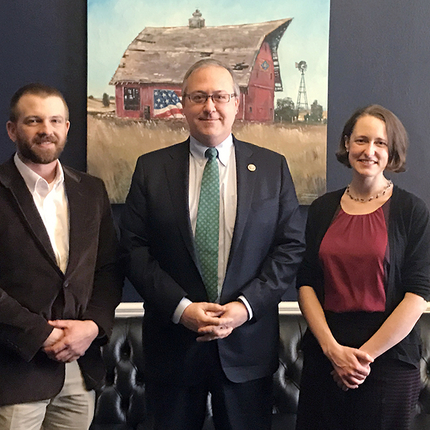Dustin Farnsworth flew to Washington D.C. this spring to speak with his lawmakers about the importance of conservation programs.
The farmer took part in a National Sustainable Agriculture Coalition (NSAC) “farmer fly-in,” joining growers from Oregon, Mississippi, North Dakota, Wisconsin, Alabama, and Georgia who talked important food and farm issues with their legislators.
Priorities of the “farmer fly-in” included working lands conservation, rural economic development programs, sustainable agriculture research, technical assistance for military, veteran, and socially disadvantaged farmers and ranchers, and food safety training for small and mid-sized producers.
Dustin owns 400 acres in southwest Iowa. He currently has hogs and cattle, and is converting some corn and soybean acres to organic.
He also participates in the Conservation Stewardship Program (CSP), the nation’s largest working lands conservation program by acreage. The program supports farmers, ranchers, and forest owners as they introduce and expand conservation on their land in agricultural production.
In Washington D.C., Dustin joined Anna Johnson, of the Center for Rural Affairs, in a meeting with Rep. David Young. They discussed two important working lands programs, CSP and the Environmental Quality Incentives Program (EQIP).
Conservation funding provides farmers and ranchers with the tools, training, and financial support they need to protect and conserve natural resources on their land. Programs like CSP and EQIP not only protect the environment, they also help farmers produce more with less and ensure the long-term viability of their lands and waters.
Dustin emphasized to Rep. Young the importance of these programs because they support beginning farmers in implementing conservation practices while farmers run viable businesses.
Does it really make a difference to talk to your legislator?
Dustin visited Washington, D.C. to discuss conservation this spring, several weeks before Congress passed a bill to fund conservation programs for this year. That final bill had good news for conservation: funding for CSP was not cut as it had been in previous years, and while there was a cut to EQIP, it was not as large as in previous years.
Rep. Young sits on a committee that works to decide what funding conservation programs will receive each year. While Dustin’s conversation with him is surely only one of many such conversations he has with constituents, we are grateful he listened to the message: strong conservation programs are needed in Iowa!
You, too, can let your representative and their staff know your concerns and priorities - whether it’s calling an office, attending a town hall meeting, meeting at the county fair, or visiting the state house or Washington D.C. Here are some tips for how to make sure that conversation goes well:
- Make sure to ask about issues your representative can impact. Rep. Young, for example, can impact funding for federal programs like CSP and EQIP, but has less of a role in deciding issues regarding the Iowa Department of Natural Resources, which is a state agency.
- Plan out three things to say: 1) a thank you for past work; 2) a story about the issue you care about; and 3) an ask for them to act to support your issue of concern.
- Your ask can go something like this: “Will you support strong funding for working lands conservation programs like EQIP and CSP?”
- Stay friendly and brief.
- Be sure to thank them for their time.
Feature photo: Iowa farmer Dustin Farnsworth and Anna Johnson met with Rep. David Young (R-IA) to discuss CSP and EQIP.





